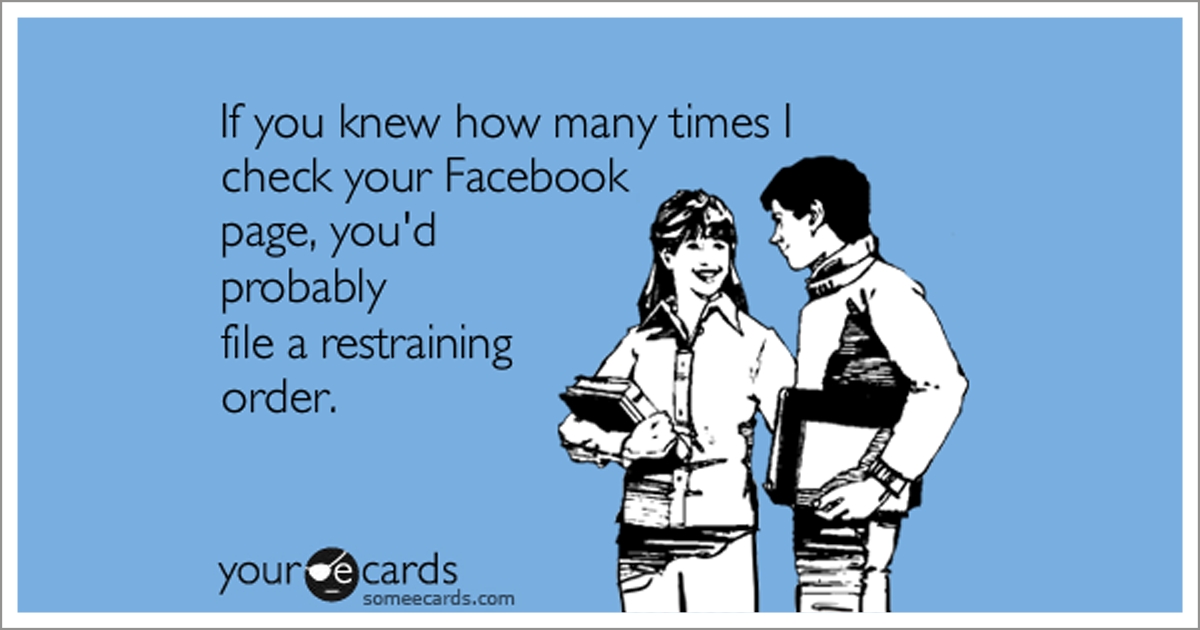Ever wonder how Facebook decides how to suggest whom you should "friend"? Sometimes the suggestions make sense; sometimes, they're a little bizarre.
Data mining through the use of algorithms uses your connections beyond what you might realize, even drawing logical conclusions based on what your connections have posted. For example, if you have not listed a hometown or high school, but your sibling on Facebook did, it's likely that you'll receive "friend" suggestions based on your sibling's information. Wall posts, "likes," tagged photos, and everything you've ever clicked on are all data points used to establish your connection to others.
This is where Facebook "creeping" comes in. Whether you are checking up on an old high school sweetheart, or just clicking on someone who posted an interesting comment to a friend's page, each time you visit someone's page, a data point is collected. If you look at a profile several times, Facebook's likely to suggest that person as a "friend." This could, of course, lead to some uncomfortable situations: Do you really want your name to show up on your ex's new girlfriend's list of suggested "friends"? Probably not.
In addition to possibly creating an uncomfortable friend request situation, Facebook "creeping" is not particularly good for your mental health, especially if you are keeping tabs on a former romantic partner. A 2012 study by Veronika A. Lukacs found that more than eighty-eight percent of the participants she studied engaged in surveillance or "creeping" on Facebook after a break-up, even going as far as logging on with a friend's account, in cases where they had been "unfriended" by their former partner. Most reported that seeing their ex's activities, especially relating to new relationships, caused emotional distress. Conversely, Lukacs found that those who "unfriended" or blocked ex-partner's posts experienced less distress, as they weren't inadvertently exposed to information about their ex-partner as a normal part of their newsfeed. A similar study, published by Tara C. Marshall in 2012, found "that continued online exposure to an ex-romantic partner may inhibit post-break-up recovery and growth ... Notably, frequent monitoring of an ex-partner's Facebook page and list of friends, even when one was not a Facebook friend of the ex-partner, was associated with greater current distress over the breakup, negative feelings, sexual desire, longing for the ex-partner, and lower personal growth." The bottom line: You'll get over the break up faster if you're not constantly exposed to information about the person.
There's also the issue of "idle curiosity" becoming something disrespectful to your current partner, or damaging to your relationship. When an old boyfriend shows up in your news feed, you may think, "What harm can looking do?" According to Duana Welch, Ph.D., "Flatly put: It's dangerous to reconnect with an old flame, even—perhaps particularly—if you are happily married and are merely curious about how things turned out for your first love; and it's foolhardy to casually encourage your spouse to look up their former sweetie." If you're tempted to reconnect with an old flame, the cause may be dissatisfaction with your current relationship. In the land of social media, where people tend to publish only the positive, your old flame may appear preferable to your current partner, and your dissatisfaction with your current relationship may appear even greater, in contrast to what you think your "lost love" might offer. The recurring advice from a bevy of marriage counselors: Just don't go there.
Is anyone "creeping" on you? There are many hacks purported to let you see who has been viewing your profile, by looking at the page source code. I tried several sets of instructions to see if they worked. Maybe it's just that I'm not tech savvy enough, but none of the codes that came up revealed the name of my boyfriend from my freshman year of college, or anyone else. There are also many apps that claim they'll allow you to see who's been "creeping" on your page. Facebook's official line on this issue: "No, Facebook doesn't let people track who views their profile. Third-party apps also can't provide this functionality. If you come across an app that claims to offer this ability, please report the app."
If you are worried about others "creeping" on your Facebook page, you can use your privacy and security settings to keep strangers from seeing your personal information. A good piece of post-break-up advice: Change the password to your social media accounts. In Lukacs' study, one participant admitted to logging into his ex's account so that he could keep her under surveillance, even though he had been unfriended. You can also "unfriend" or block those whose information you'd rather not see popping up in your newsfeed. But if you continue to visit someone else's page, there's no way to keep Facebook's algorithms from suggesting you as a friend.




